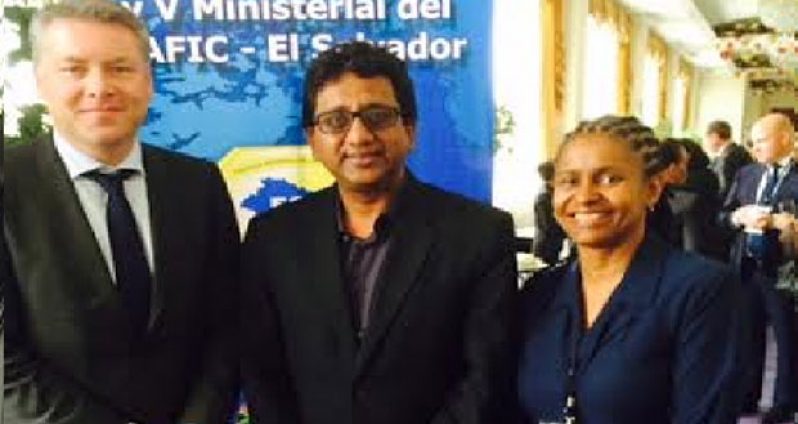GUYANA was required to provide an update of its position regarding improvements to the local Anti-Money Laundering and Countering the Financing of Terrorism (AML/CFT) framework, following the Financial Action Task Force (FATF) meeting in Paris, France in October 2014.
The country was represented at the Caribbean Financial Action Task Force’s (CFATF) Plenary Meeting XL, and Special Ministerial V Meeting yesterday in San Salvador, El Salvador, by a team led by Attorney General and Minister of Legal Affairs, Anil Nandlall. The other members on the team are from the Financial Intelligence Unit (FIU).
Guyana was referred to FATF last November by the CFATF, after missing a compliance deadline, and consequently the country was blacklisted regionally. The move was a result of Guyana’s cited failures regarding the passage of the Anti-Money Laundering and Countering the Financing of Terrorism (AML/CFT) (Amendment) Bill, which continues to languish before the local Parliamentary Special Select Committee reviewing the Bill.
AGREED ACTION PLAN
Nandlall at the meeting told the gathering that Guyana has submitted an Action Plan after collaboration with the American Regional Review Group (ARRG).
According to him, this Action Plan was submitted and approved by FATF at the Paris meeting, where a high level commitment was given by President Donald Ramotar, pledging Guyana’s commitment to implement the plan.
IMPLEMENTATION TIMEFRAME
Also during the ARRG engagement the Attorney General underscored the challenges faced by the current Administration at the Parliamentary level. Therefore, the AARG recommended that Guyana be granted until September 2015 to implement the legislative measures and until May 2015 to implement the non-legislative measures. This recommendation was accepted at the FATF meeting in Paris.
Guyana’s engagement with the AARG followed a July 9, 2014 letter from FATF, which officially confirmed the body’s decision to commence a targeted review of Guyana prior to the October 2014 plenary meeting.
FATF made it clear that the purpose of that targeted review would be to examine the most significant deficiencies in Guyana’s AML/CFT framework that pose a risk to the international financial system.
Since the FATF’s October plenary, despite having averted the devastating consequences of being blacklisted, Guyana will be subjected to an ‘Ongoing Process in Improving Compliance’ to ensure that the country’s AML/CFT framework is up to par with international standards.
WORK ONGOING
To this end and in light of the agreed terms in the Action Plan, Nandlall told the gathering that the non-legislative measures are being implemented with “dispatch” and there is “every likelihood” that these will be completed long before the May 2015 deadline.
He also recognised the assistance which Guyana continues to receive from the diplomatic community in Guyana at various levels.
Relative to the legislative measures, the Attorney General pointed out that this is the area that continues to pose “tremendous challenges” to the Government of Guyana, since up until the Paris meeting the majority comprising of the joint Opposition in the National Assembly refused to lend their support to the enactment of the AML/CFT (Amendment) Bill 2013, which captures all the requisite legislative measures.
REGIONALLY BLACKLISTED
Noteworthy, however, is the fact that Guyana remains regionally blacklisted. Nandlall acknowledged that many jurisdictions in the Region have responded to the CFATF’s public statements by issuing directives and instructions to the relevant agencies within those jurisdictions informing of the status of Guyana and to continue to take measures or prepare themselves to take measures to protect themselves from the risks which Guyana poses or will pose should the situation deteriorate.
These jurisdictions include the British Virgin Islands, Bermuda, Curacao, Dominica, St. Maarten, Trinidad and Tobago, the Turks and Caicos Islands, Jamaica, Bahamas, Barbados and Montserrat.
PARLIAMENT PROROGUED
The Attorney General also highlighted that since the Paris meeting, Guyana’s Parliament was prorogued by President Donald Ramotar on November 10.
One of the grounds for the prorogation of the Parliament was to offer an opportunity by the President for the Government and the joint Opposition to enter into constructive engagements in order to arrive at consensus on a number of national issues, including the swift enactment of the AMLCFT (Amendment) Bill.
The Attorney General emphasised that should no compromise be produced by this offer of the Government, then National Elections will be inevitable.
He also assured that the enactment of the AML/CFT Bill will continue to be of the highest priority on the Government’s Parliamentary agenda when Parliament resumes and every effort will continue to be exerted to ensure that this Bill is passed within the timeframe agreed upon in the Action Plan.
Both FATF and CFATF, the FATF-style regional body (FSRBs), is expected to continue to work with Guyana and to report on the progress made in addressing the identified deficiencies.




.png)









